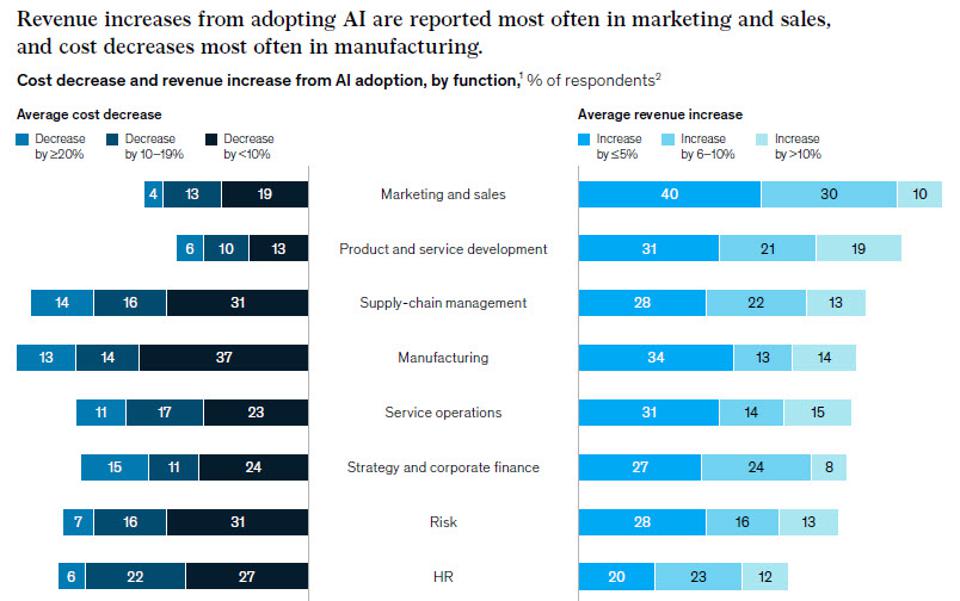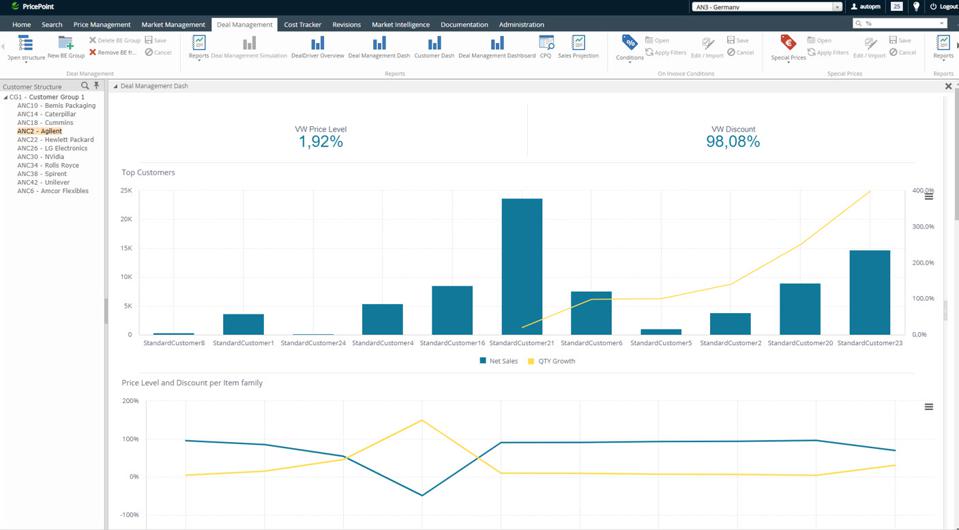
Predictive opportunity scoring, predictive lead scoring, predictive analytics for forecast … [+]
getty
- Price optimization dominates AI’s contributions to improving sales this year based on conversations with CROs and CEOs.
- Predictive opportunity scoring, predictive lead scoring, predictive analytics for forecast management and guided selling are the top four AI-based technologies B2B selling organizations plan to deploy in the next 12 months, according to Gartner.
- By 2025, 60% of B2B sales organizations will transition from experience- and intuition-based selling to data-driven selling, merging their sales process, sales applications, sales data and sales, according to Gartner.
- Revenue increases from adopting AI are reported most often in marketing and sales and cost decreases most often in manufacturing, according to McKinsey’s recent Global AI Survey.
Sales organizations are under increased pressure to reduce selling costs while stabilizing margins and closing only the most profitable deals. Marketing teams across all industries are under increased pressure to increase the quantity, quality and qualification levels of leads that deliver the highest probability of closing this year. AI-based price and revenue management applications and platforms are proving indispensable in keeping sales, marketing, operations, services, accounting and senior management synchronized with real-time updates to achieve more. The following are the ten ways AI is revolutionizing selling today:
1. 40% of Marketing & Sales departments using AI platforms & apps achieve 6% or higher average revenue growth. McKinsey’s Global AI Survey: AI proves its worth, but few scale impact survey provides insights into where AI is making its greatest contributions and reducing expenses. The majority of executives whose companies have adopted AI report that it has provided an uptick in revenue in the business areas where it is used and 44% percent say AI has reduced costs. A key takeaway from the study is Marketing & Sales are the clear leaders in revolutionizing how they generate revenue with AI.

McKinsey’s Global AI Survey: AI proves its worth, but few scale impact survey
2. AI’s greatest contributions to sales this year are improving the accuracy, scale and speed of price optimization. Sales VPs, Chief Revenue Officers (CROs) and CEOs say that adopting AI-based price optimization is among the best decisions they made before and during the pandemic to protect margins and resist descending into price wars. AI-powered price optimization is improving business’ viability, driving more revenue and profit growth and has proven to cost-effective in implementing solutions. AI-based price and promotion have the potential to deliver between $259.1B to $500B in global market value, according to McKinsey. Leaders in this area include Vendavo, who has decades of experience providing price optimization solutions for the chemical, distribution, high tech, manufacturing and aftermarket industries. Vendavo PricePoint is a cloud-based platform that enables B2B organizations to centrally manage price and deal guidance across the product portfolio, global sales teams, customers, channels and markets. The following is what Vendavo’s PricePoint interface looks like:
MORE FOR YOU

Vendavo.com
3. AI-based lead scoring is making a significant impact on automating lead qualifications this year. Every CMO and their CRO counterpart are having discussions about how the rate of opportunities transitioning from Marketing Qualified Lead (MQL) to Sales Qualified Lead (SQL) can be improved. Pre-pandemic lead weighting for many B2B companies isn’t working because one of the most valuable sources of leads, events, is no longer available. AI is helping to balance the remaining sources of lead generation with revised qualified criteria.
4. Using AI-based cross-selling and upselling to improve win rates on deals in their aftermarkets, manufacturers are increasing their adoption applications that seamlessly work with their CRM systems. Salesforce Einstein is gaining adoption in manufacturing as more CROs look to their aftermarkets for more margin and revenue growth as new deals have slowed down this year. B2B-based manufacturers who have decades of customer data in their Salesforce CRM systems say Einstein can qualify existing customers as leads in seconds – saving inside sales weeks and moving closer to making an aftermarket sale.
5. AI-based Demand Generation is having an impact on Sales by assisting Marketing with the challenging task of generating new leads and knowing their propensity to buy in real-time. CMOs are adopting AI-based Demand Generation apps and platforms to better plan and execute marketing strategies that yield more MQLs with a higher propensity to become SQLs. Knowing why acceptance and rejection rates are happening on a given campaign, the impact of content strategies on lead growth and how the time spent in each stage of qualification influences close rates. AI-based demand generation is also providing new insights into marketing’s contribution to revenue and marketing-influenced deals in sales pipelines.
6. Using AI to improve Customer Lifetime Value (CLV) is becoming commonplace, making this a core metric of marketing and sales effectiveness. Using AI to understand what factors most contribute and detract from CLV is providing sales and marketing teams with the knowledge they need to fine-tune shared prospecting and selling strategies. Most importantly, AI enables marketers to deliver more personalized engagement across sales cycles and anticipate what customers will be most interested in over time.
7. AI is improving territory optimizations today by matching the best available sales reps with potential and new accounts then measuring sales effectiveness, especially on new product launches. It’s interesting to hear CROs explain how they’re adopting AI to re-assign their sales teams and create new territories in response to the changing demand patterns for their products and services. Combining AI-based territory optimization techniques and CRM is reducing the cost of sales by 11% to 20%, according to Forrester’s estimates.
8. AI-based marketing account intelligence apps help sales managers more precisely define and target the ideal customer profiles they need to close more sales. Designed to bring greater precision to marketing & sales campaigns that had relied primarily on a “spray and pray” approach, AI-based insights are providing sales teams with account rankings with the highest probability of close. Advanced AI-based marketing account intelligence systems recommend who, in a prospective customers’ organization, is most influential in the buying process. Leaders in this market include ZoomInfo, InsideView, Adapt, Marketo, Priority Engine, UpLead, Cognism, Act-On, Metadata.io and Infer.
9. As marketers put greater emphasis on content marketing strategies over events, AI-based sales content personalization systems are taking off this year. Several CMOs and CEOs I’ve spoken with recently are saying AI-based content personalization is helping accelerate sales cycles by providing prospects with customer testimonial videos and related content. The challenge is to create content fast enough to be fresh for each stage of each persona’s sales cycles the AI-based system is designed to optimize.
10. AI is revolutionizing sales forecasting by improving propensity, pricing and run-rate prediction models with more accurate algorithms than has been available in the past. 2020 has also been a breakout year for AI-based sales forecasting, specifically in combining location analysis as part of propensity models. Salesforce Einstein’s customer and use case examples in this area are representative of the advances in model accuracy and usability. CROs are integrating sales forecasting workflows across their CRM systems this year to improve selling efficiency and close rates.
